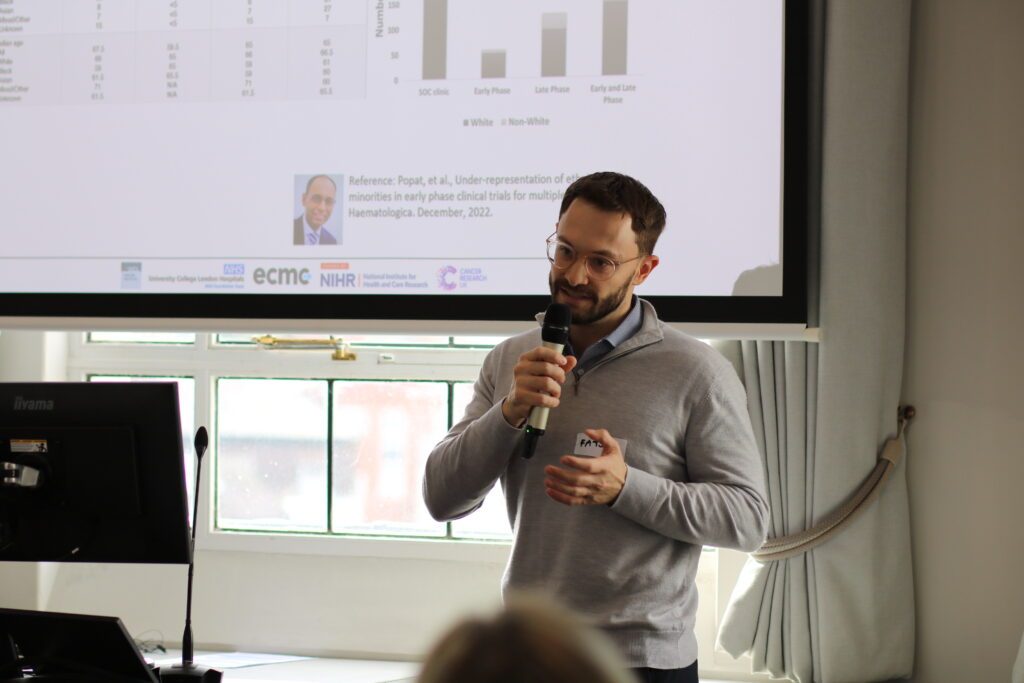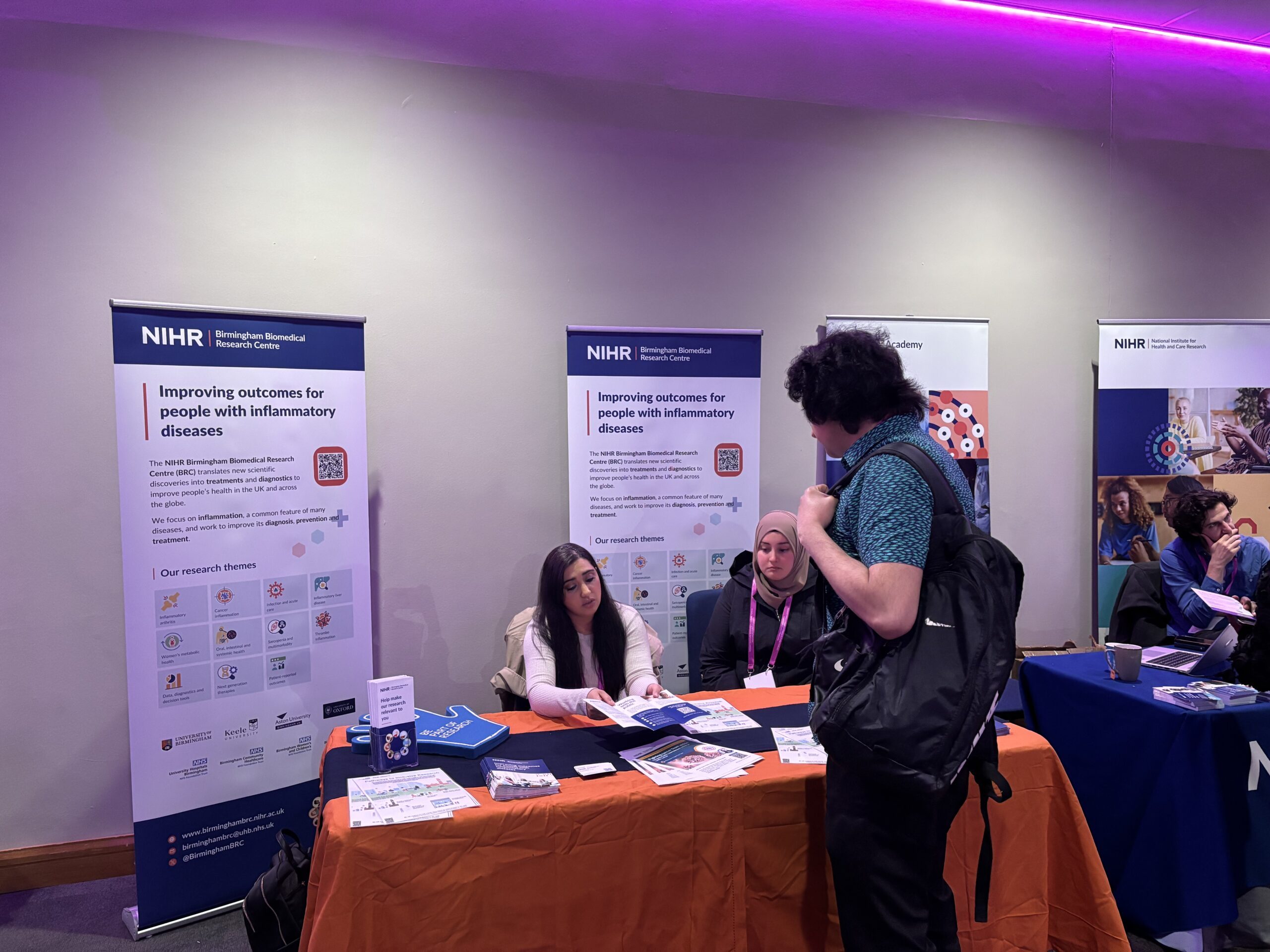Home » News and events »
NIHR Birmingham BRC co-hosts inaugural BRC/CRF Inclusion Conference

On 17 October 2024, the NIHR Birmingham Biomedical Research Centre (BRC) and the NIHR Birmingham Clinical Research Facility (CRF) hosted the inaugural national BRC/CRF Inclusion conference led by Bristol BRC and a small group of BRCs and CRFs including Oxford, Birmingham, UCLH and Sheffield. This event marked the first in-person gathering of Equality, Diversity, and Inclusion (EDI) leads from NIHR Biomedical Research Centres (BRCs) and Clinical Research Facilities (CRFs) across the UK, and aimed to provide a platform for EDI professionals to share insights, strategies, and challenges related to embedding inclusive practices within the research lifecycle.
After a warm welcome from Dr Victoria Day, Head of our Birmingham BRC, and Dr Hazel Phillips, Chief Operating Officer at the Bristol BRC, Dr Esther Mukuka, NIHR Head of Research Inclusion, summarised the NIHR’s approach to EDI and introduced the new NIHR requirements applying to all NIHR domestic programmes from November, which make inclusion an explicit condition of funding.
Dr Phuong Hua, postdoctoral researcher from the University of Bristol, then presented her in-depth analysis of EDI strategies across BRCs and CRFs, highlighting common themes across objectives, action plans and success measures, how and to what extent intersectionality was considered, and consistency with the NIHR strategy.


After a break, during which attendees could view the posters presented by BRCs and CRFs to summarise each infrastructure’s EDI strategy, the following session featured a wide range of talks focusing on practical approaches to data collection.
First up, we heard from Dr Heidi Green, Director of Health Equity Innovation and Researcher in Residence at global patient engagement agency COUCH Health. Titled after Malvina Reynolds’s ‘Little Boxes’, Heidi’s presentation reflected on how too often diversity data collection in research studies doesn’t reflect people’s complex identities – and even though pre-defined categorisation is often necessary, there are steps we can take to make it less uncomfortable and more accurate. These include, for example, clearly sharing the reasons for diversity data collection, allowing participants to self-describe, and transparently reporting on diversity data when disseminating results. “Boxes will never fit everyone”, concluded Heidi, “so while it’s important that we strive to improve how we collect diversity data, let’s focus on progress over perfection, and work together to make the boxes better.”
Freen Mehdi and Byron Batten, EDI leads for our Birmingham BRC and CRF, delivered an engaging presentation focused on ways to enhance staff data collection and analysis to foster inclusivity. With a live survey in the room confirming that time, trust, and uncertainty about the benefits of providing data are considered some of the biggest barriers in this process, Freen and Byron highlighted the importance of leadership protecting time of staff; transparency; and demonstrating that data collection leads to positive change through, for example, “You said, we did” campaigns.


Fatjon Dekaj, Early Phase Cancer Trials Research Manager at University College London Hospitals, spoke about the socioeconomic status of participants in early phase cancer trials. Fatjon highlighted how trial set up can lead to under-representation of patients from ethnic minority or socially deprived backgrounds. For example, a demanding trial schedule with long stays in hospital, as well as long distances and high travel costs to reach trial units, discourage less affluent patients to participate – and what would appear to be simple ways to help with these issues, such as pre-paid cards to cover travel costs to trial units, are too often not that easy to implement.
Sarindi Aryasinghe, Programme Manager for Digital Health and Patient Experience at Imperial College London, explained how her team used natural language processing to assess the effectiveness of the inclusive recruitment programme at the Imperial College Healthcare NHS Trust. Their analysis highlighted how, even though the relative proportion of ethnic minority candidates have increased since the implementation of the inclusive recruitment programme, there are still significant gaps in terms of the number of role offers, average interview scores, and the sentiment of feedback provided to candidates. Suggested improvements included providing additional guidance on the shortlisting process, identifying ways to support internal ethnic minority candidates to apply for roles, and increasing awareness and availability of inclusive recruitment training.


The session continued in the afternoon, starting with Connie Shiridzinomwa from the Bristol CRF presenting her team’s Protected Characteristics (PCs) Project, aiming to establish an efficient process to collect data on PCs, caring responsibilities and deprivation from all participants in NIHR research across their Integrated Care Board as well as developing KPIs to measure the effectiveness of interventions to widen research participation.
Chrissie Adams, Equality, Diversity and Inclusion Research Associate at the NIHR Moorfields BRC and CRF, explored learnings from study and system level barriers in data collection, which include, for example, data not being recorded centrally or in a consistent way, lack of mandatory data collection and variation in commercial studies. To tackle this, their team changed EDGE profile options, ran education sessions, and developed an accessible equality questionnaire for iPad which patients can fill out with a self-service approach and in a private space. “We need to take back control at a local level”, concluded Chrissie, “inclusion work should be about creating new ways of doing things. Expecting existing systems to ‘fit’ people within them is not equity.”


Dr Nicola Anderson and Dr Ameeta Retzer from our Birmingham BRC and CRF told us about their work to ensure more people benefit from Patient Reported Outcomes (PROs) data in research studies. Their recommendations included working across diverse NHS trusts to capture a broad sample of patients; offering surveys in both paper and electronic forms, as well as telephone interviews, to minimise digital exclusion; carrying out prespecified multiple regression analysis with participants’ demographic and socio-economic survey data, and qualitative participant sampling to achieve maximum variation according to participants’ demographic and socio-economic characteristics. “Ensuring oversight from a patient and public involvement panel also helps with acceptability and data minimisation”, they said.
To conclude the session, Rachel Delahay and Shun-yan-toto To, Research Facilitators at the Oxford Health CRF, explained how they’ve developed and piloted a demographic questionnaire at a mental health CRF.
The last session encouraged table discussions around the topics emerged during the day, with attendees reflecting on actions and learnings to take home. The conference concluded with a call to action for continued collaboration and knowledge sharing across the NIHR, with a strong consensus on the need for improved mechanisms to disseminate best practices and avoid duplication of efforts. Plans are already underway for regular meetings for BRC and CRF EDI leads, and in-person follow-up event next year is also in the pipeline.


Freen Mehdi, Inclusion Manager for the Birmingham BRC, reflected on the day’s achievements, stating: “This conference has provided valuable insights and created the opportunity to share ideas across the BRCs and CRFs. We aim to continue our collaborative approach to take significant steps towards developing a more equitable, diverse and inclusive research environment. We look forward to building on this momentum and driving meaningful change.”


